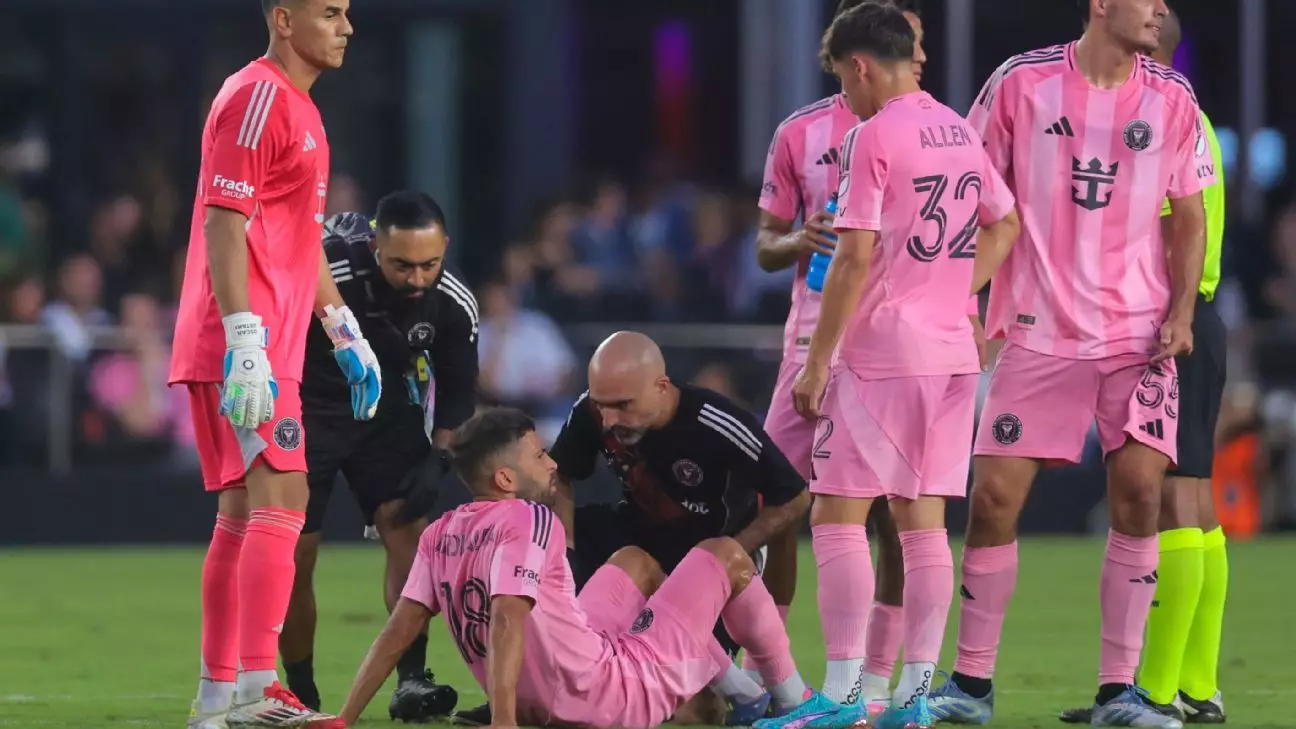In sports, adversity often reveals the true mettle of a team. Inter Miami CF, under the guidance of head coach Javier Mascherano, showcased this sentiment during their recent clash against Montreal, where they clinched a 4-2 victory despite an unexpected spate of injuries that threatened to derail their momentum. This match did not merely highlight Miami’s tactical prowess; it also illustrated the significance of unity and collective spirit in overcoming setbacks.
Entering the game, Miami faced a daunting task not only from their opponents but also from a rapidly depleting squad. The first half proved particularly tumultuous as defenders Gonzalo Luján and Jordi Alba succumbed to muscular injuries, forcing immediate tactical adjustments from Mascherano. These injuries weren’t just individual setbacks but posed a strategic conundrum, illustrating the fragility of team composition in high-pressure situations.
Depth and Injury Issues Highlighted
In the sports arena, injuries can significantly impact a team’s depth and performance capacity. The night took an unexpected turn when Tomás Avilés took Luján’s place but soon encountered misfortune as he twisted his ankle, leading to yet another early substitution. Mascherano’s analysis of the injuries serves as a stark reminder of the unpredictability of sports: “It is unusual to have to use our windows so fast because of the injuries.” Here, he captures the essence of the game’s unpredictable nature, emphasizing how quickly the tide can turn.
Despite the initial setback, the team displayed remarkable resilience. Mascherano eloquently articulated the spirit of cohesion: “This shows that the team is united and they want to get out of this situation.” His words resonate not just as a coach’s commentary; they encapsulate the transformative power of collective experience in sports. Moments like these often catalyze stronger relationships among players, who are forced to adapt and work together under pressure.
Looking Ahead: The Challenge of a Thin Roster
As Inter Miami prepares to face the Columbus Crew, the concerns about roster depth linger. With several players, including Yannick Bright, David Ruiz, Drake Callender, and Baltasar Rodríguez, already sidelined, the challenge intensifies. Bright’s ongoing hamstring issues accentuate the precariousness of Miami’s squad. Mascherano’s candid acknowledgment of the team’s roster limitations—in particular, his pointed remarks about the need for depth due to recent departures—aligns with a broader dialogue in team management: how to efficiently bolster a squad when funds are limited.
This isn’t a mere logistical challenge; it’s a significant sporting reality. The potential acquisition of Brian Rodríguez from Club América suggests that Miami is actively seeking solutions. This rumored interest not only highlights the urgency to address roster deficiencies but also reflects a strategic vision. Such recruitment efforts are essential, especially as the Club World Cup looms on the horizon, scheduled for June 14. It is here that Miami’s leadership will be tested—not only in terms of game strategy but in the ability to judiciously manage resources and nurture a competitive edge.
A Testament to Team Spirit and Forward Motion
It’s vital to recognize that the 4-2 win against Montreal wasn’t merely a statistical achievement; it was a validation of team spirit, resilience, and strategic flexibility. Mascherano’s observations about the need to reinforce the team echo a sentiment that is, unfortunately, all too common in professional sports. Teams are perpetually managing the dual pressures of competition and player management, which can seem like an insurmountable balancing act.
As Miami charges forward, every game becomes not just a test of skill but a crucial juncture for player cohesion and morale. The landscape ahead will undoubtedly be challenging as they face teams like the Columbus Crew and contend with their injury-riddled roster. However, as they move on, the unity and heart demonstrated on that fateful Wednesday night may prove to be their most valuable asset, potentially paving the way for a stronger, more cohesive future within the league. Miami’s strength lies not in the physicality of their roster but in the unwavering determination of their players to rise above the fray. This spirit, once kindled in adversity, often becomes a cornerstone for enduring success in sports.

Leave a Reply